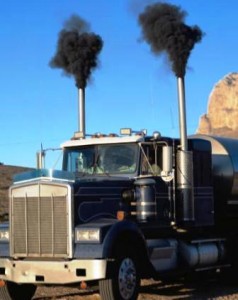
Diesel emissions have been linked to lung cancer, especially in emerging markets where pollution controls are minimal.
Government officials took the unusual step of closing some of the freeways in Beijing earlier this month, the latest in a series of increasingly frantic efforts to reduce the city’s seemingly endemic problems with air pollution so severe many residents now walk around wearing masks to reduce the amount of soot and smoke they breathe in.
They have reason to worry, warns a new study released by the International Agency for Research on Cancer. Based in Lyon, France, and the cancer research arm of the World Health Organization, the IARC has formally declared what many medical experts have long suspected: that air pollution causes lung cancer.
The study points an accusing finger at a variety of sources, including the coal-burning power plants of China, the widespread agricultural operations of California – and the diesel cars and trucks found all over the world.
“The air most people breathe has become polluted with a complicated mixture of cancer-causing substances,” said IARC department chief Kurt Straif told the Associated Press, warning that air pollution is now considered to create a more serious risk of lung cancer than second-hand cigarette smoke. The agency contends more than 220,000 people around the world died in 2010 due to cancers arising from air pollution.
The IARC study follows up on earlier reports that warned about the risk of specific types of air pollution. It contends that pollutants have become so ever-present that in many parts of the world the simple act of breathing puts people at risk for not just lung but possibly other cancers including that of the bladder.
(Diesels stake strong presence among finalists for Green Car of the Year. Click Here for more.)
A major concern is the presence of so-called particulates, super-fine particles of soot and other substances that can find their way deep into the lungs. That’s been a particular concern for those who oppose the expanded use of diesels.
“People can certainly contribute by doing things like not driving a big diesel car, but this needs much wider policies by national and international authorities,” Straif said.
It’s not the first time the World Health Organization has taken aim at the diesel engine, the organization declaring diesel exhaust “a known carcinogen” in a June 2012 report. But the WHO decision was somewhat nuanced, suggesting that the problem was more severe in emerging markets than in countries like the U.S. – and particularly in Europe, where diesel is the powertrain option of choice in roughly half of all new vehicles sold each year.
That’s because so-called “Clean Diesel” technology uses a variety of filtering techniques to not only reduce the emission of smog-cancer oxides of nitrogen, or NOx, but also those ultra-fine particulates. In fact, contends Scott Keogh, head of Audi’s U.S. sales arm, the maker’s latest diesel models may produce less of this soot in their exhaust than some gasoline-powered vehicles.
(2014 Ram Diesel named “Truck of Texas.” Click Here for more.)
Audi isn’t the only automaker to be concerned about the new IARC air pollution study. German automakers, in general, have been increasing their range of diesel offerings in the big U.S. market as more consumers show interest in the high-mileage technology. Audi has three new diesel models coming to market for 2014, while BMW and Mercedes-Benz are expanding their own line-up. But other makers, including Chevrolet, Mazda and Chrysler, also are adding so-called “oil-burners.”
(Mazda delays SkyActiv Diesel debut by six months. Click Here to find out why.)
Many Americans still remember the diesels of decades past, with their rough ride and foul-smelling smoke. Even among those aware of the new “Clean Diesel” technology, not everyone has warmed to the latest powertrains. California clean air regulators continue to put new hurdles in front of diesel engineers demanding they do an even better job of eliminating particulate and NOx emissions.
But there are also proponents among environmentalists who counter concerns about diesel pollution. They not only defend the latest emissions control systems but note that diesel also produces less CO2, the gas directly linked to global warming.
Significantly, two diesel models – the Audi A6 TDI and the 328d – were among the five finalists for Green Car of the Year. Only one hybrid was named to the list while the other two models were advanced versions of conventional gasoline technology.
“I’m suspicious” of the new IARC research that paints all forms of diesel power with the same carcinogenic brush, Ron Cogan, founder of the Green Car award and publisher of Green Car Journal, told TheDetroitBureau.com. “I want to know what their science is.”
Cogan argues that “every technology has its issues,” contending that the latest diesel powerplants are about as clean as anything on the road, including electric vehicles which may rely on dirty coal plants for their power.
Whether the new IARC study will lead regulators to rethink diesel power – perhaps by demanding even more stringent emissions control systems — remains to be seen.

China has enough U.S. dollars and Euros to actually resolve their self-created smog issues if they cared to.
Thanksfully Clean Diesels, which have been around over 8 years, are not a concern at all for air polution because the exhaust is extremely clean.